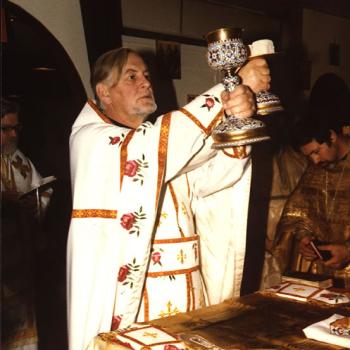The early Christians believed that Christ had come to bring heaven down to earth. The ancients believed that the cosmos was hierarchical: God ruled the outermost sphere of the universe, and successive levels of subordinate power ruled those spheres below them.
In biblical times, kingdoms were much different from the nation-states of today. They were not defined exclusively by geography and contiguous boundaries on maps. A kingdom consisted of everyone who was loyal to a particular king. If you pledged loyalty to that king, then you were part of that kingdom. One of the most radical teachings of the early Christians was the idea that God had come down to rule the earth directly, bypassing the "powers and principalities" of the lower heavens. God, through the coming of the Christ, had come into the world in person, and now the kingdom of heaven on earth was in the process of coming into being.
Since most kings of the ancient world claimed that their power was delegated to them in some way by God or the gods, the Judeo-Christian idea of pledging direct loyalty to God as one's only king was considered seditious. The political system of the ancient world was viewed as a manifestation of the cosmic order, so the early Christians' revolutionary cosmology had profound practical consequences. Through mystical union with the divine, you pledged your loyalty to God and entered the kingdom of heaven on earth. That is why Jesus would tell people that they were close to or far from God's kingdom: they were more or less awake to the fact that God's kingdom was among them already, more or less ready to take the radical step of abandoning loyalty to the kings of this world.
Jesus' many sayings about "the kingdom of heaven" imply this new intimacy between sky and ground, between God and people. Jesus was not talking about an afterlife so much as he was describing a future life that would happen as more and more people became "subjects" of God alone, in their hearts and through their actions. God and humanity were working together to make heaven and earth into one. "The glory that you have given me I have given them, so that they may be one, as we are one..." (John 17:22) This communion between humanity and God would revolutionize the world with social justice and peace.
Salvation and damnation, heaven and hell, are experiences that people have during their natural lifetimes here on earth. But I still take the idea of an "afterlife" seriously. I have watched people die, and I have read and heard accounts of people who have been revived after being pronounced clinically dead. It seems to me that it is impossible for a person to experience his or her own death. You can experience near-death, those last few seconds or microseconds of brain activity that appear to last past the cessation of detectable heart or brain activity. But no one can experience the end of life; when it is over, you aren't there to experience it. Therefore, from the point of view of the person who is dying, life may be eternal, without end.
Some people who have been brought back from near-death report a profoundly beautiful experience as their bodies stop functioning, an experience that continues to unfold and does not suggest an imminent cessation of the experience. Others who have been brought back from near-death don't remember anything at all -- including any experience of being "dead." For them, it was like waking up from a dreamless sleep. So death as the end, the cessation of subjective experience, is not something we ever know. We can only know life. And in some cases, it appears that life takes on an eternal, endless quality during the last minutes or seconds of bodily functioning.
Eternal life is a subjective experience. From the point of view of the people watching somebody die, that person's existence comes to a final end. But from the point of view of the person dying, his or her life is without end. Part of that experience of eternal life may be a frightening and painful process. But sometimes that subjective experience of eternal life resembles the traditional Christian vision of what heaven is like.
I don't think we have total control over our experience of eternal life at death. However, I suspect we can prepare ourselves for it by practicing self-awareness, letting go of negative thoughts, and ceasing to cling so tightly to our bodies, possessions, and egos.
One of the most important things I have discovered from practicing prayerful meditation and other spiritual disciplines is that much of what I think and feel is optional. Now, pain itself is not usually optional. We all go through pain. Bad things happen beyond our control. But how we interpret this pain, how we think about it, how we react to it -- all this is optional. These are things we can change. Making the change may not be easy, but it is certainly possible.
Hell is the most negative imaginable interpretation of what life and the universe are all about. But it's an optional interpretation. We really do have the choice of experiencing that same life and that same universe as heaven. Jesus was not in denial about the existence of the Roman Empire and its oppression of the people of Israel. But in the same place and among the same people of the Roman Empire, he saw the kingdom of heaven on earth. Everywhere he went, everywhere he looked, he found evidence of its existence. He chose to interpret the world around him in a positive and hopeful way, and his vision changed the world both spiritually and physically.




